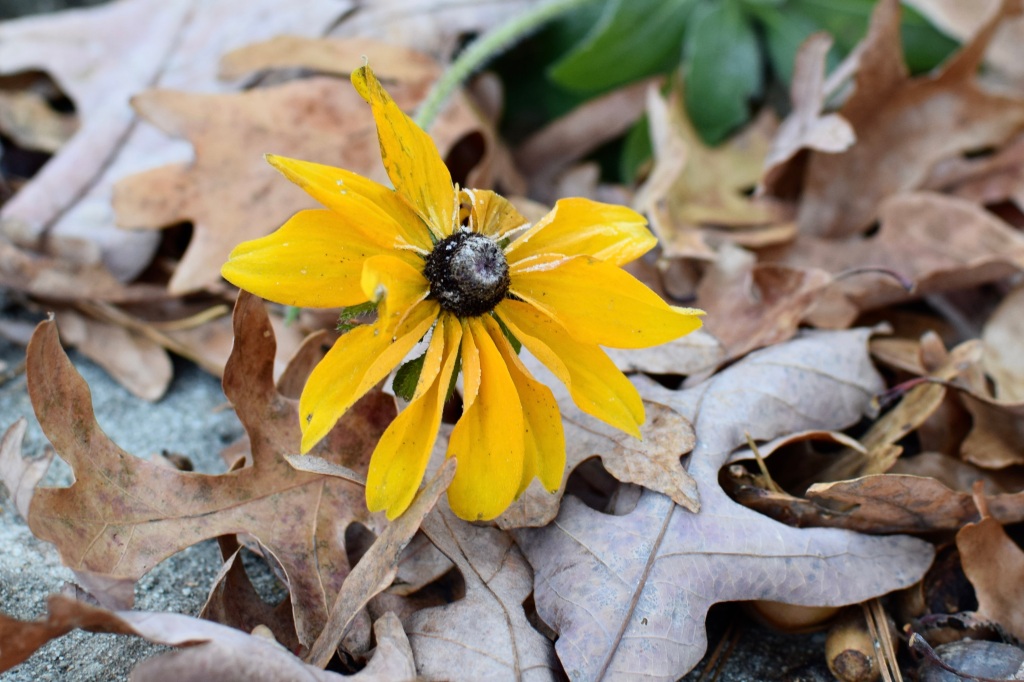
There is a single flower, a Rudbeckia, left in the small front garden. A solitary yellow asterism, lowly dipping with the weight of frosty mornings on its leaves and stem and face. It’s seen two weeks of mornings below freezing. Afternoons slightly above. All hours surrounded by itinerant leaves from the white oak overhead. They collect near the bloom, around and beneath it. One or two catching against its leathery, tongue-like leaves. One of the yellow petals lightly rests on the driveway, cold from the weather and the sun’s position this time of year, both of which keep flower and drive alike adorned in shade. Save for two pots of shriveling yellow pansies, the Rudbeckia stands (or dips) alone.
Winter in this part of the world—the southeastern region of Turtle Island (the so-called United States) “begins” in six days. That particular day, December 21, is a day of transitions. Here, it is the day of the year with the least amount of sunlit hours between dawn and dusk. It marks the end of a season and signals the opening road to the garden’s re-emergence through another. [It also happens to be the day that I was born.]
There are other transitions happening around us now, many of which were not as visible (through distraction and carelessness and busyness alike) but no less tangible. The suffering of others, now captured more often through video, shared worldwide through social media by independent journalists—themselves members of the populations under siege—, blooms its own terrible bouquets, despite such suffering being longstanding. Despite the media distortions and false (or buried) narratives that have long since kept wool over so many of our eyes. Despite the capitalist system that cannibalizes our time and energy and attention. Despite the limitations of this witnessing.
Seventy-five-plus years for Palestine. Decades for the Democratic Republic of Congo. Three-plus years for Tigray. There are so many years and pains and places across the world—among them Sudan, Kanaky, Cameroon, Artsakh, West Papua, Western Sahara, the Kingdom of Hawai’i—that there is not enough space for one person to address their realities through words on a screen, much less in conversation or “award-winning” books (including by people who have, after covering such atrocities, either honed a convenient silence or actively criticized people for undertaking acts of resistance against the perpetrators (and facilitators) of those atrocities).
The blooms of suffering are invasive in a world that encourages their roots. They bleed over borders, which themselves cause their own lacerations. Fungal networks of the capitalist class (and their agents) extend the reach, exploiting greater and greater spans of land and resources. Cracking foundations.
And yet, the careful, pruning hands of tomorrow are donning their gloves. Sharpening their tools. The healers once thought to be all killed and betrayed in Gil Scott Heron’s “Winter in America” have been re-emerging more and more. Gathering together. Coalescing towards a fertile otherwise world. Reaching towards the knotted roots of empire, of settler colonialism, of white supremacy and capitalism and ecocide and beginning, however small at first, to tear away at them. No doubt: winter is long and cold and brutal. But it cannot last forever.
The Rudbeckia is alone in its fullness. This much is true. But above and behind it, a Korean spice viburnum holds on to pale magenta buttons of buds. To its left, a hibiscus tree sports tiny dots of its tomorrow, like vertical lines of Morse code speaking to the few birds who remain (bluejays, house finches, mockingbirds, the occasional Eastern towhee). They make early promises to the bees and wasps and beetles that will revisit them when winter ends. When the gathering resumes. There is something to be said about small emergences of what is to come, be it in a small garden beside a driveway in Atlanta or a garden of metropoles rimmed by every ocean, all tilting on a blue sphere away from—and towards—the sun.
2 responses to “Transitions”
One of your best. Thank you for the love you give so freely and is accepted so readily.
a blue sphere. yes. is wh